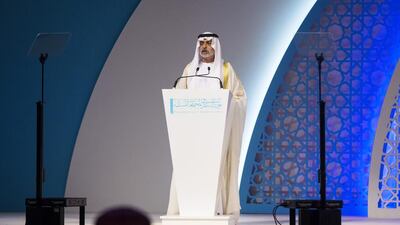ABU DHABI // It is wrong to expect all Muslim societies to be governed as one state – or caliphate – by trying to apply a political system that dates back centuries, speakers at a conference said on Sunday.
At the Promoting Peace in Muslim Societies Forum, it was agreed that Muslims must adjust to the geopolitical realities of the modern world.
The third edition of the forum aimed to correct misunderstood principles that have caused some of the damage witnessed today, with the nation state being the core subject of the two-day conference, which will be attended by more than 400 scholars and thinkers from around the world.
“The forum has chosen an appropriate slogan ‘peace paths from Abu Dhabi begin’,” said Sheikh Nahyan bin Mubarak, Minister of Culture and Knowledge Development.
“This country is keen by all means to support all Muslim societies in facing all challenges.
“Clearly, a successful nation state should be based on strong foundations and on the principle of citizenship and social values.”
Early Islamic societies succeeded because they had a variety of nationalities and races “and our religion made this variety a source of power, positivity and civilisation”, said Sheikh Nahyan.
The secretary general of Al Azhar, Abbas Shoman, said that it was not possible “in our time for all societies to gather under one caliph (leader) who will rule over all Muslims.”
Muslims have integrated in many countries “so how could all these countries pledge allegiance to one ruler?” And where would the ruler settle?
“Those are idiotic ideologies and push the Muslim youth to an absolute doom. Our role as scholars is to stand in one line and clarify what Islam truly is,” said Mr Shoman.
Moreover, the caliphate system is not compulsory in Islam, and all modern political systems are accepted by Islamic law.
He said the Quran did not specify a political model that must be followed, while if one looks back at the different procedures followed for appointing each ruler that followed the Prophet Mohammed, that is proof that all are legitimate.
“What they claim for is not to bring the caliphate state back to life, but it is a scam to lure the youth from all over the world,” said Mr Shoman.
They use this falsehood to tempt young people to seek power and resources under the name of their false caliphate, he said.
“And, in order to protect their mission, they condemn anyone who opposes them as being an infidel.”
The president of the forum, Shaykh Abdallah bin Bayyah, asked: “What does it mean that the state has to be Islamic?”
He referred to an incident a few years ago in Jordan when discussions started about what would happen if an Islamic state was formed.
“What about the existing (Muslim) countries, what are they then?”
There has been confusion about these concepts and what they mean, he said. “If we do not correct misconceptions, peace cannot be achieved.”
Bosnia’s Grand Mufti Prof Mustafa Ceric said the policies of groups like ISIL aimed to divide Muslims.
“I am not a conspiracy theorist, but I see that the theories of [ISIL] are foreign made and it is not possible that such evolved from the Quran or Sunnah,” he said.
In the Middle Ages, when European countries tried to defeat the Ottoman Empire, there were publications distributed in Europe that called for jihad “and the authors were all non-Muslim. So this is like [ISIL]. It was created to hijack Muslims from Islam.”
Yahya Pallavicini, the vice president of the Italian Islamic Religious Community, said that the forum should aim to answer a question that is often raised in Europe.
“What are Muslim mainstream scholars, religious leaders doing to answer to the abuse of religion done by jihadists.”
hdajani@thenational.ae


